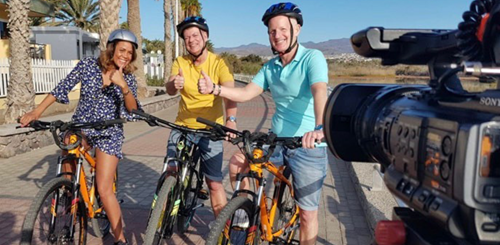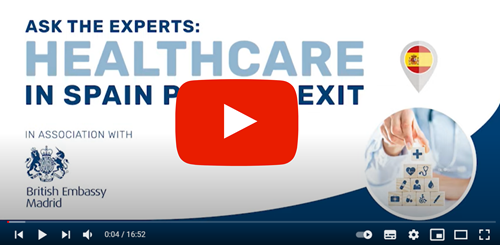
Now that Britain has left the EU, it’s becoming common knowledge that Britons cannot spend more than 90 days at a time in the Schengen area, nor can they go and live there, without a visa.
Spain is still where many people want to go for a host of reasons – not least for a good dose of sunshine after the rather disappointing British summer of 2021 – but also the wide choice of affordable property.
The non-lucrative residence visa, a type of long-stay visa, will be the route that many Britons may take. You don’t have to buy a property to get one – like you do with the so-called ‘golden visa’ – but you do have to show you have enough income to support yourself in Spain. It is not for people working in Spain, so it’s the obvious choice for self-sufficient early retirees, who form one of the biggest groups of property hunters in southern Europe.
You will find lots of information online listing all the documents you might need (the Spanish consulate’s website does this too), or there’s a summary of the process here. But there are a few bits of the process that come as a bit of a nasty surprise.
The initial visa application starts in the UK – via the Spanish consulates - and that is where the fun starts. Eight months on from Brexit, the process, and how to navigate it, are becoming a little clearer, according to a handful of property hunters who’ve shared their experience with us, including Colin and Richard from Glasgow, who you might have watched looking for a property in Gran Canaria in an episode of our TV series that was first broadcast in 2020. So here are a few useful pointers that we hope might save you some time.

1. Allow plenty of time
There are three Spanish consulates in the UK: London, Manchester and Edinburgh, and readers report receiving slightly different advice from each one. You need to ring up to book an appointment in advance to have a face-to-face interview and your documents inspected so make sure you factor in time to do this – and note that you’ll need one appointment each if you are a couple. You may need a few weeks to get all the documents together, and then the processing time is one to three months so don’t book your flights out to Spain until you are well down this road.
2. Budget for more than the application fee
It’s too early to know if this might be a typical cost, but Colin and Richard have paid over £1,000 to get their visas (not including the health cover). The visa application fee for the couple was £516 per person, the police certificate another £55, but it also depends on how much you ask your lawyer to do for you, and of course legal fees vary widely. Some more costs are mentioned below; and another buyer reports she has spent £1,800 on legal assistance to help expedite the process for her so far, but if you are in a hurry, it might be money well spent.
3. The must-have medical certificate: don’t ask the NHS
One of the consulate’s list of 11 required documents is a Medical (Health) Certificate signed and stamped by a registered doctor. This certificate must state that the applicant does not suffer from four particular diseases: smallpox, SARS, polio and Influenza A. Most GPs are busy enough with other tasks and don’t have the liability insurance so you may need to get this from a private doctor. This costs £10-£150 per person – depending on the provider - but bear in mind there are extra costs for these to be translated and legalised (see below).
4. Take cover: private healthcare costs
This might not be unexpected, but if you are under 65 you will need private medical cover in place when you have your visa appointment (you need to show them the policy). This needs to be full private health insurance from a Spanish healthcare company without any excess and with full repatriation cover. Shop around but anecdotal reports suggest around £200 per month for a 50+ couple. Find out more about healthcare in Spain by watching our webinar.
Watch our Spanish healthcare q+A
5. Cost in translation
All the documents you are taking for inspection at the interview need to be translated into Spanish. You must use a translator approved by the consulate who will provide you with a list of approved people. This can cost around £150 and take time to turn around (see point 1).
6. Keep it legal
Not only will you need to have the documents translated but you will also need to have the police report (acro.police.uk) legalised – which means having an apostile (certificate) attached to it. For this you need to send your originals to the UK Foreign & Commonwealth Office to have the documents checked and signed by a notary public or other public official. You can find out more here. The standard service costs £30 per document, plus courier fees or postage – again, allow time for this process – 10 days is the FCO estimate.
7. Getting your docs in a row
You will need to make copies of all of these and correctly organise them in your application file which will be inspected at the consulate. For the proof of income requirements (€2,259.60 per month for the main applicant) you’ll need to take along copies of payslips/pension statements and six months of bank statements (all translated into Spanish and copies of them). “I didn’t get bank statements translated, I just highlighted where the monthly payments were shown coming in and the Spanish Consulate [in Edinburgh] said these were really useful and well organised,” suggests Colin.
8. But don’t take too long (or get it wrong)
According to Colin and Richard the documents they have had to have legalised are only valid for three months so if their application is rejected, they will have to start the process all over again (with more costs and delay). There’s not much wiggle room if the consulate takes between one and three months to process the application so carefully plan when you should start preparing your documents.
9. You’ll need to give up your passport (for a while)
Bear in mind the consulate will retain your passport after your visit to process the application so ensure you’ve made a copy of it for your own needs - and don’t plan any overseas trips until you get it back. It might be six weeks or so until you get it returned.
10. Extra help (at a cost) and guidance
Legal companies are quickly realising there is much money to be made helping British people get visas (golden visas can incur way more hefty legal costs) so professional services are becoming available in the preparation of documents and hand-holding during the process. As more people go through the process there’s the hope it might become easier to navigate.
To this end we are keen to help share advice, so have any experiences to add? Do get in touch with us at [email protected].
For more information about moving to Spain post Brexit, see our Relocation section.
